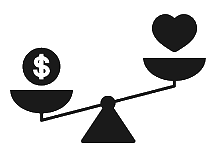When new buyers consider owning versus renting, they must evaluate pertinent information including property affordability, down payment availability, taxes, utilities, maintenance, interest rates, insurance costs, and other opportunities.
Space is a finite resource and a secure asset that rarely decreases in value over the long term, providing a competitive return. As an owner, you can reasonably expect your home equity to increase over time as you pay down a mortgage. Combined with property value appreciation and rental income, this can rapidly increase your net worth. Buying a property may offer tax advantages, equity growth or borrowing for other projects and investments.

Renting leaves you without property investment but possibly with lower living expenses and other investment opportunities. Buying a house means less concerns about rental increases or landlord demands. Most importantly, new homeowners can enjoy building security, stability, utility and satisfaction of securing their position. Homeowners move less frequently, lowering stress, fostering a stronger sense of community, and giving control over the immediate environment.
Down Payment and Insurance for New Buyers
The Canadian Mortgage and Housing Corporation (CMHC) or private institutions provide mortgage default insurance for up to 95% of the house’s lending value, eliminating the need for a large down payment. Eligible borrowers include those buying a home in Canada as their principal residence with appropriate income and credit history.
Down payment sizes vary, generally ranging from 5% to 20% of the purchase price depending on the mortgage type. To avoid additional CMHC insurance premiums, conventional mortgages require a minimum of 20%.
Regardless of the mortgage type, a larger down payment leads to long-term savings by reducing monthly principal and interest payments and the total interest paid over the mortgage’s life.
New Construction Versus Resale
Resale properties usually exist in established neighborhoods, offering relatively lower prices per square foot. However, they may incur higher maintenance costs and obsolescence as market preferences change. Negotiation opportunities exist for price and possession dates.
New construction generally incurs lower maintenance and utility costs, often accompanied by several years of warranty. Prices and possession dates are set by developers with limited negotiation opportunities. GST/HST applies to new construction sales but may be offset by government rebate programs. There are also municipal development charges that may be applicable before occupancy.
The decision to buy a property involves a comprehensive assessment of various factors that vary from each property. Professional guidance proves invaluable in navigating this complex landscape, providing clarity on costs and helping strike a balance with other available options. Ensure that you are making informed decisions aligned with financial goals and lifestyle preferences.

